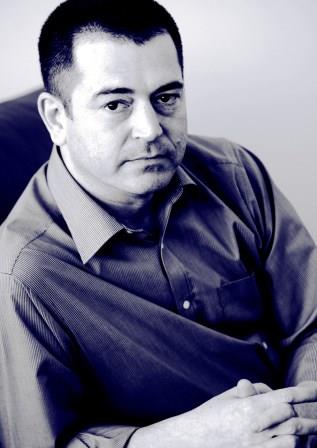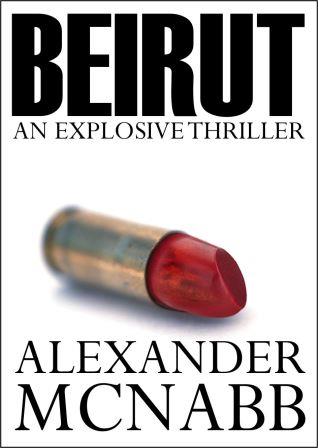Interview with Expat author - Alexander McNabb
 Alexander McNabb is from the UK and has been working in,
living in and travelling around the Middle East for over 25 years. Currently located in the UAE, Alexander is a frequent conference speaker,
chair and moderator, particularly on issues around online and digital
communications.
Alexander McNabb is from the UK and has been working in,
living in and travelling around the Middle East for over 25 years. Currently located in the UAE, Alexander is a frequent conference speaker,
chair and moderator, particularly on issues around online and digital
communications.
1. Why did you move abroad?
Oof, start with the small questions, eh? I was working for a UK based publishing company specializing in trade magazines for the Middle East, particularly in technology, and as time went on it was more and more obvious we needed to set up in the UAE. So I started up a partly owned subsidiary here back in 1993 and the rest, as they say, is history.
2. How do you make a living? Are you a fulltime writer?
No, I wish! I’m the director of a digital communications consultancy called Spot On Public Relations. I moved out of publishing into PR in the late 1990s, rather like a frog being boiled – it sort of happened before I realized it. And then PR turned into getting more involved in online and digital marketing, which is the day job today.
3. How did you start the process of writing a book and get it published? Did you go to a publisher? Self-publish?
How long have you got? I wrote a book back in 2001/2002, a very silly spoof called Space, and totally failed to get it published. In fact 100-odd agents took the opportunity to reject it. By about 2004 I’d written another book a serious novel about a British journalist in Jordan who manages to get himself into a huge amount of hot water through his own frailty – Olives – A Violent Romance - which joined the first one in a desk drawer after another 100-odd rejections. My third effort, testosterone-soaked international spy thriller Beirut – An Explosive Thriller landed me an agent, but fourteen top London publishers all agreed they didn’t want it. So I threw my hands up and self-published. And I am so very glad I did. It’s not about the money, it’s about actually letting your work out of that desk drawer.
Both Olives and Beirut have met with widespread critical acclaim. Actually, Olives generated quite a deal of controversy which, strangely, Beirut – a lot more scurrilous a book - hasn’t. But I’ve given readings, done book clubs, been an author at the Emirates Airline Festival of Literature, given talks to schools and generally had the pleasure of sharing my work with people. I’ve come to realize how much people invest in a book they read, how important it is to me that they have enjoyed my work and how strongly people react to the characters and situations I’ve flung together. It’s an amazing privilege.
4. What was the hardest part of taking your writing to a book format? Did you blog before writing your book?
No, I blogged because I’d stopped writing and missed my former life as a journalist and editor. I found writing novels to be huge fun from the get-go, but had to relearn how to write – part of the reason I sat down to write a book was that as a journo, I’d written millions of words and as a PR guy I’d written more – speeches that made audiences cry, articles, white papers, research reports. Hell, I thought, why not a book? It took me a while – and the help of some patient writer friends – to work out that there was a reader involved in all of this and that perhaps I owed that reader a little more consideration than I had offered before. I learned how to write books, basically – a process that saw me re-thinking the way I wrote and the techniques and craft I used. Now, thanks to the Dunning Kruger effect, which has been a constant companion in my journey, I’m not sure I can write books at all.
5. What is your perception of the expat book market? Has it changed throughout the process?
Is there an expat book market as such? The Middle East book market is tiny by comparison, the region’s reading habits are odd and dominated by ‘easier’ media like television. I’ve always aimed at the mainstream UK and US markets. And missed, so far. But I ain’t about to give up trying…
6. What is your favorite part of the book?
The wordy bit in between the covers? Actually, I’m very fond of my book covers, too. I have multiple books, so not sure which one to talk about. If we’re talking about Beirut – which is the ‘current’ book, I’ve got quite a few favourite scenes. The opening, where I do something horrible for people who’ve read Olives (Beirut’s not really a sequel as such so you can read it as a standalone perfectly happily), a scene where someone’s killed by a glass of champagne and a sweaty Albanian hooker sunbathing – and what happens next - are all moments I enjoyed. But there are loads more in there. They’re all tumbling back to me as I write this and now I’m lost in my own book. How selfish!
7. What was the most difficult part to write?
I don’t find writing difficult as such – but I cried like a baby when I took the decision to write the last pages of Olives the way I did. It was the right thing to do, but it hurt me more than I had ever guessed it would. With Beirut, it’s all just insane-paced international spy thriller and it really had its own momentum.
8. Besides your books, what book should everyone read?
Seven Pillars of Wisdom by TE Lawrence. The Alexandria Quartet by Lawrence Durrell. A Handful of Dust by Evelyn Waugh. The Honourable Schoolboy by John Le Carré.
9. What advice would you give to other expats that want to write a book?
Do it. Get help and advice. Read up on it. Don’t go it alone for years the way I did, Make writer friends. Have fun. Share.
10. What are you working on now? Do you have plans to publish another book?
Oh, yes. I’ve just finished writing my third spy thriller set in the Levant, Shemlan – A Deadly Tragedy. That one’s with my agent, who’s currently working out whether he thinks he can sell it to publishers. If not, I’ll publish it myself this fall. The three books share some characters and are roughly contiguous but all three are very different books that stand alone, they’re not a trilogy as such. Shemlan’s about an old British diplomat who’s dying of cancer, so it’s a deal darker than the other two.
 Find Alexander's books on Amazon.com, follow him on twitter @alexandermcnabb, or check out his blog at Fakeplasticsouks.blogspot.com. The title refers to the ‘new’ souks of Dubai, so much more
convenient and classy than the real ones.
Find Alexander's books on Amazon.com, follow him on twitter @alexandermcnabb, or check out his blog at Fakeplasticsouks.blogspot.com. The title refers to the ‘new’ souks of Dubai, so much more
convenient and classy than the real ones.
Michel Freij is a powerful man. But he wants more. Two hundred kilotons more.
Michel Freij is poised to become the next president of Lebanon. The billionaire businessman’s calls for a new, strong regional role for the country take on a sinister note when European intelligence reveals Freij has bought two ageing Soviet nuclear warheads from a German arms dealer.
Maverick British intelligence officer Gerald Lynch races to find the warheads, believed to be on board super-yacht the Arabian Princess, before they can reach Lebanon. Joined by Nathalie Durand, the leader of a French online intelligence team, Lynch is pitched into a deadly clash with Freij and his violent militia as he pursues the Arabian Princess across the Mediterranean.
Beirut – An Explosive Thriller sweeps through Lebanon, Hamburg, Prague, Malta, Albania and the Greek Islands on its journey to a devastating climax.
Part of the EasyExpat.com adventure since 2008. Drink, Travel, Write